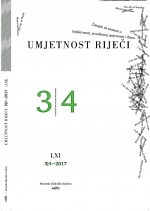Putovanje kao alegorija u prozi o Drugome svjetskom ratu
THE MOTIF OF JOURNEY AS AN ALLEGORY IN PROSE ON WWII
Author(s): Maciej CzerwińskiSubject(s): Studies of Literature, Military history, Bosnian Literature, Croatian Literature, Montenegrine Literature, Serbian Literature, WW II and following years (1940 - 1949)
Published by: Hrvatsko filološko društvo
Keywords: images of war; communist ideology; metaphor; allegory;
Summary/Abstract: The paper considers prose written between 1945 and 1970 as revealing changes in attitudes towards the communist idea in Croatia, and Yugoslavia, especially as regards the construct of the protagonist, i.e. the partisans. In the immediate post- WWII period, partisan activities are conceptualized as a journey through time towards a well-defined goal. In the 1950s, their journey is transformed into roaming that is eventually resolved, and from the 1960s, into roaming with no destination point, i.e. no goal. The first journey exemplifies the earliest communist vision of the bright future to which the partisans and society aspired. The second exemplifies the moment of hesitation that emerges during the journey, but is resolved. The third exemplifies hesitation that is presented as contamination of ideals and a catastrophe. The first journey is associated with the communist orthodoxy (tribal collectivism), the second with its critical re-evaluations (critical collectivism), and the third with decadent tendencies (individualism).
Journal: Umjetnost riječi
- Issue Year: 2017
- Issue No: 3-4
- Page Range: 201-219
- Page Count: 19
- Language: Croatian

